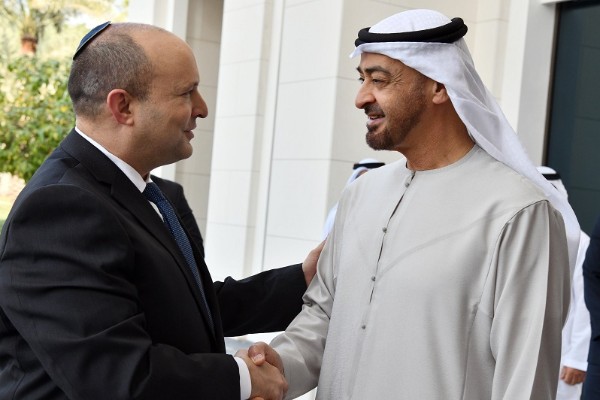Crown Prince Sheikh Mohammed Bin Zayed accepted an invitation to visit Israel.
By Pesach Benson, United With Israel
Prime Minister Naftali Bennett concluded a historic visit to the United Arab Emirates, the first by an Israeli premier to the Persian Gulf state. Bennett met with the Emirati de facto leader, Crown Prince Sheikh Mohammed Bin Zayed, who accepted an invitation to visit Israel.
“We held deep, honest and significant conversations,” Bennett said after spending four hours in talks with MBZ, as the crown prince is known. “We spoke about the relative strengths of the two countries, and our goal is to broaden the connection so that there will not only be peace between leaders but peace between peoples.”
“I am leaving here with great optimism that this example, of ties between the two countries, will be a cornerstone for a wide-ranging network of ties throughout the region,” he said.
The leaders discussed diplomacy, the Iranian threat and other strategic issues, as well as bilateral trade and economic ties.
A joint statement issued afterwards referred to expanding cooperation in areas of trade, tourism, technology, and the environment. It also referred to the establishment of a fund to foster joint research and development projects. Notably, the statement did not mention the Palestinian conflict nor the Iranian threat.
No timeframe for the Crown Prince’s visit to Israel was indicated.
Although Israel, the UAE and Bahrain signed the Abraham accords in 2020, COVID travel restrictions and repeated election campaigns prevented former Prime Minister Benjamin Netanyahu from making or hosting state visits.
MBZ has essentially ruled the UAE since 2014, when his older half-brother, Emir Khalifa bin Zayed, suffered a stroke. The Emir retains some ceremonial functions but ceded policymaking matters to the 60-year-old Crown Prince.
The Vienna Backdrop
Bennett’s visit came amid faltering US-Iranian nuclear talks in Vienna. Negotiations are deadlocked by Tehran’s insistence that the U.S. release billions of dollars in frozen Iranian assets and remove sanctions as a precondition to discuss the Islamic states nuclear program.
Skeptical Israeli officials fear that President Joe Biden’s administration will settle for an agreement that ends the current sanctions on Iran if the Islamic regime simply ceases its uranium enrichment — which would be even worse than the JCPOA agreement negotiated by President Barack Obama in 2015.
The JCPOA agreement of 2015 was signed by Iran along with with the five permanent members of the UN Security Council — the U.S., Russia, China, France and Britain — as well as the European Union and Germany. The agreement is vehemently opposed by Israel, Saudi Arabia and the Gulf states. President Donald Trump withdrew the U.S. from the JCPOA in 2018.
President Biden has made returning to the nuclear agreement a key foreign policy goal.
Israeli Defense Minister Benny Gantz is in Washington discussing joint military readiness and possible drills for action against Iran.
Iran denounced Bennett’s UAE visit. A Foreign Ministry spokesman in Tehran said that “such actions are disruptive to the region’s security and go against the interests of the Islamic nation and the people of the region and Arab countries,”



